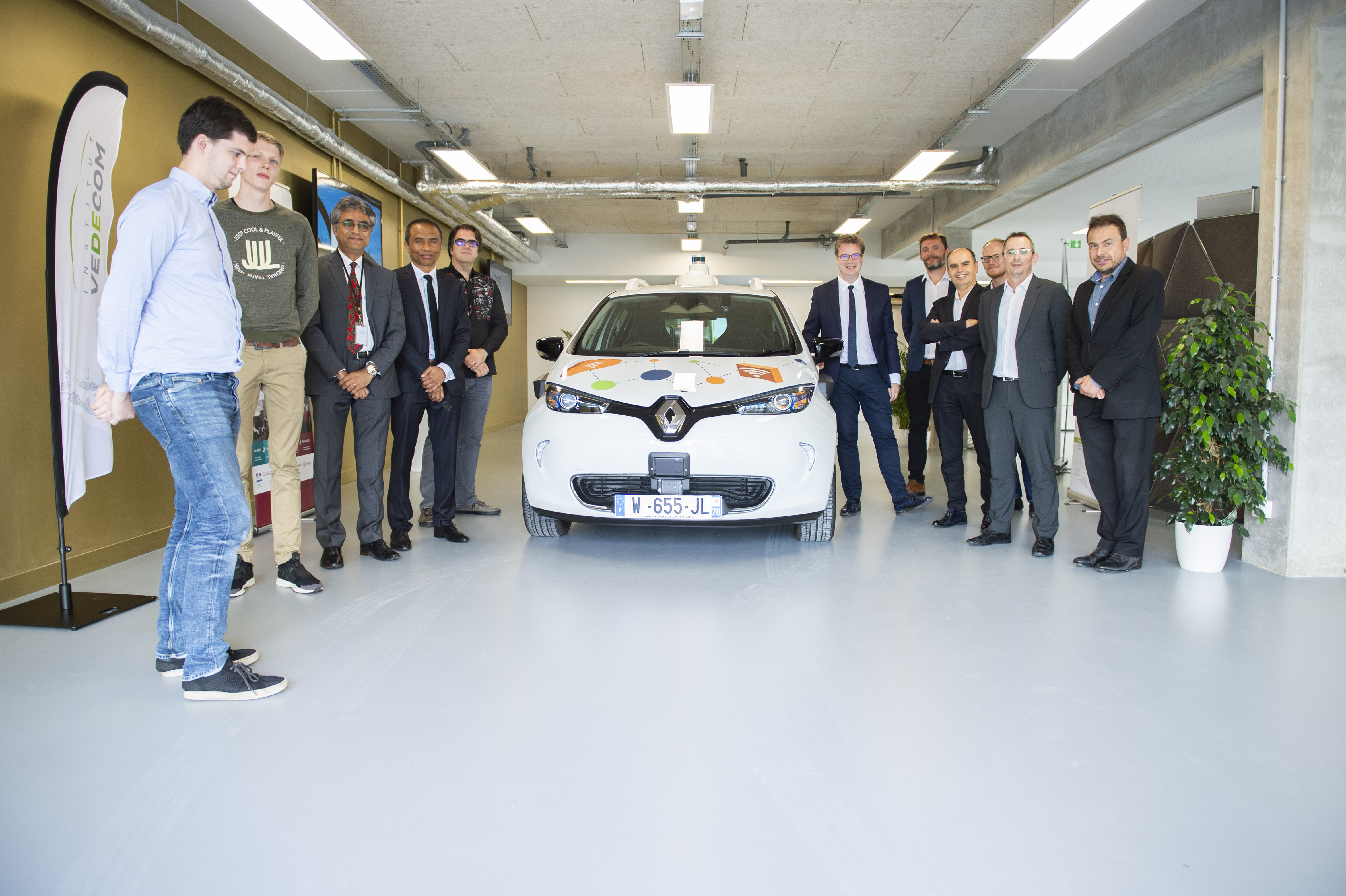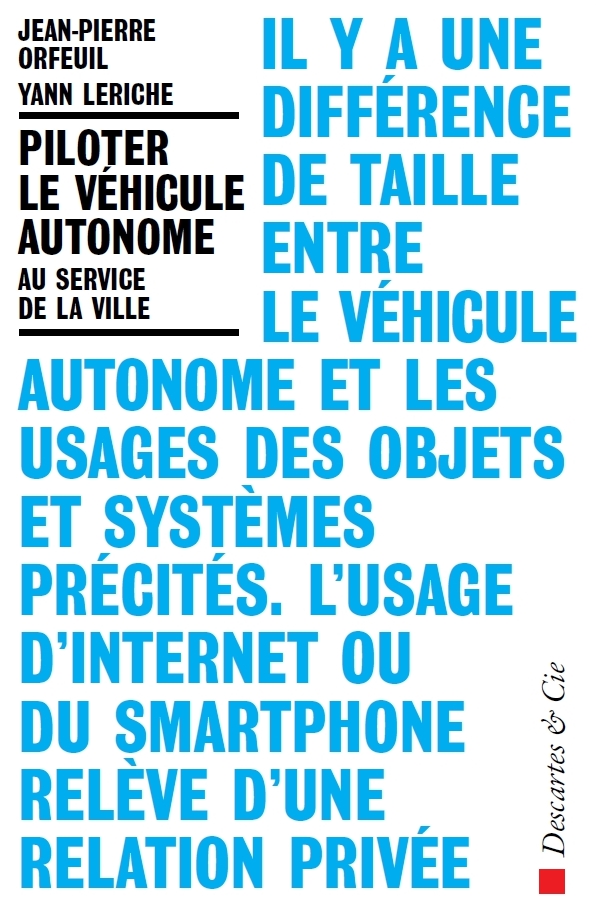VEDECOM is very pleased to announce you the defense of the thesis of Ali ZIAT entitled ” learning representation for time serie forecasting and classification” on Monday 16 october 2017 in the Jussieu Campus.
The scientific supervision of the thesis within VEDECOM by Mr. Bertrand LEROY.
COMMITTEE
Ahlame Douzal, Université Joseph Fourier Grenoble 1, Rapporteur
Latiffa Oukhellou, Ifsttar, Rapporteur
Matthieu Cord, Université Pierre et Marie Curie – LIP6, Examinateur
Jean Michel Loubes, Institut de Mathématiques de Toulouse, Examinateur
Bertrand Leroy, Institut VEDECOM, Encadrant
Ludovic Denoyer, Université Pierre et Marie Curie – LIP6, Directeur de thèse
ABSTRACT
In this thesis we develop new methods that address the challenges of time series analysis. Our con-tributions are focused on two tasks: the prediction of time series applied to road traffic prediction and time series classification. Our first contribution presents a prediction and completion methods for multivariate and relational time series. The aim is to be capable of simultaneously predicting the evolution of time series that are linked by a graph (that could represent, for instance, the distance between several sensors), as well as completing the missing values in these series (that can corre-spond for instance to a fault of a sensor during a certain time period). Extensions of this model are proposed and described: first in the context of prediction of heterogeneous time series, and then for predicting time series that have an expressed uncertainty. A model for predicting space-time series is then proposed, in which the relations between different series can be expressed in a more general manner, and where they can be learned.
Finally, we will be interested in the classification of time series. A joint learning model of metrics and classification of time series is proposed and an experimental comparison is performed.
VEDECOM is very pleased to announce you the defense of the thesis of Ali MASRI entitled “Multi-Network Integration for an Intelligent Mobility” on Tuesday 28 November 2017 at the University of Versailles-Saint-Quentin-en-Yvelines.
The scientific supervision of the thesis within VEDECOM by Mr. Bertrand LEROY.
COMMITTEE
Mr. Jose Antonio F. de Macedo. Professor: Universidade Federal do Ceará, BRESIL. Reporter
Mr. Thomas Devogele. Professor: Université de Tours, France. Reporter
Mr. Bruno Defude. Professor: Telecom SudParis – Paris Saclay, France. Examiner
Mr. Dimitris Kotzinos. Professor: Université de Cergy-Pontoise, France. Examiner
Mr. Omar Boucelma. Professor: Université de Marseilles, France. Examiner
Mr. Bertrand Leroy. Project Manager: VEDECOM, France. Examiner
Mrs. Karine Zeitouni. Professor: Université de Versailles Saint Quentin- Paris Saclay, France. Director of the thesis
Mrs. Zoubida Kedad. Associate Professor: Université de Versailles Saint Quentin- Paris Saclay, France. Co-director of the thesis
ABSTRACT
Multimodality requires the integration of heterogeneous transportation data and services to construct a broad view of the transportation network. Many new transportation services (e.g. ridesharing, car sharing, bike-sharing) are emerging and gaining a lot of popularity since in some cases they provide better trip solutions. However, these services are still isolated from the existing multimodal solutions and are proposed as alternative plans without being really integrated in the suggested plans. The concept of open data is raising and being adopted by many companies where they publish their data sources to the web in order to gain visibility. The goal of this thesis is to use these data to enable multimodality by constructing an extended transportation network that links these new services to existing ones. The challenges we face mainly arise from the integration problem in both transportation services and transportation data. Our main contributions are: i) an automatic schema matching approach for geospatial datasets. It uses geospatial web services as mediators to help in automatically matching geospatial properties in geospatial datasets, ii) an approach that enables rich semantic connection generation and allows users to define custom relations between transportation data entities, iii) a multimodal trip planning approach that fully integrates ridesharing solutions within public transportation trip planners.
VEDECOM is very pleased to announce you the defense of the thesis of Julian GARBISO entitled ” Fair auto-adaptive clustering for hybrid vehicular networks” on Thursday 30 November 2017 at LINCS / EIT Digital, 23 avenue d’Italie, Paris XIII.
The scientific supervision of the thesis within VEDECOM by Mr. Bertrand LEROY.
COMMITTEE
Reviewers:
Christian BECKER, Professor, University of Mannheim
Ken CHEN, Professeur, Professor, University of Paris XIII
Examiners:
Samir TOHMÉ, Professor, University of Versailles – Saint Quentin
Bertrand LEROY, Project Manager, Vedecom Institute
Invited member: Jeremy PITT, Professor, Imperial College London
Advisors:
Ada DIACONESCU, Tenured assistant professor, Télécom ParisTech
Marceau COUPECHOUX, Tenured assistant professor, Télécom ParisTech
ABSTRACT
For the development of innovative Intelligent Transportation Systems applications, connected vehicles will frequently need to upload and download position-based information to and from servers. These vehicles will be equipped with different Radio Access Technologies (RAT), like cellular and vehicle-to-vehicle (V2V) technologies such as LTE and IEEE 802.11p respectively. Cellular networks can provide internet access almost anywhere, with QoS guarantees. However, accessing these networks has an economic cost.
In this thesis, a multi-hop clustering algorithm is proposed in the aim of reducing the cellular access costs by aggregating information and off-loading data in the V2V network, using the Cluster Head as a single gateway to the cellular network. For the example application of uploading aggregated Floating Car Data, simulation results show that this approach reduce cellular data consumption by more than 80% by reducing the typical redundancy of position-based data in a vehicular network.
There is a threefold contribution: First, an approach that delegates the Cluster Head selection to the cellular base station in order to maximize the cluster size, thus maximizing aggregation. Secondly, a self-adaptation algorithm that dynamically changes the maximum number of hops, addressing the trade-off between cellular access reduction and V2V packet loss. Finally, the incorporation of the theory of distributive justice, for improving fairness over time regarding the distribution of the cost in which Cluster Heads have to incur, thus improving the proposal’s social acceptability.
The proposed algorithms were tested via simulation, and the results show a significant reduction in cellular network usage, a successful adaptation of the number of hops to changes in the vehicular traffic density, and an improvement in fairness metrics, without affecting network performance.





